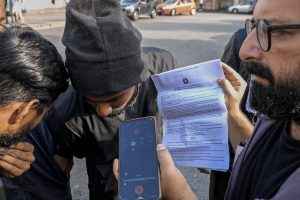Earlier this month, the governments of the United Kingdom and Bangladesh signed an agreement to expedite the return of failed Bangladeshi asylum seekers in the U.K. via a special fast-track process.
Last year, nearly 11,000 Bangladeshis entered on various visas into the U.K. and lodged asylum requests within 12 months of their arrival, adding to the burden on the British migration system.
Following the deal between Bangladesh and the U.K., British Minister of State for Countering Illegal Migration Michael Tomlinson boasted that “Bangladesh is a valued partner and it is fantastic that we are bolstering our ties with them on this and a range of other issues.”
Not only in Britain but in several European countries a record number of Bangladeshis — a whopping 40,000 — sought asylum in 2023. Instances of Bangladeshis trying to enter the United States illegally through the Mexico-U.S. border and Australia by boat have made it to the news in the past. In 2015, accounts of Bangladeshis and Rohingya crossing the seas in rickety boats drew attention to a humanitarian crisis in the high seas.
The news of an increasing number of Bangladeshis seeking asylum abroad through legal and illegal means is perplexing as Bangladesh under Prime Minister Sheikh Hasina is widely celebrated for its economic growth.
Economists like Kaushik Basu have claimed that the Bangladeshi economy is booming and celebrated economist Jeffrey Sachs observed that under Hasina’s leadership, Bangladesh has made tremendous gains towards achieving various sustainable development goals. Nobel Laureate Amartya Sen even said that Bangladesh is ahead of India on many social indicators. Indeed, in 2026, Bangladesh is set to graduate from the list of least-developed countries.
In a nutshell, these narratives, mostly by non-Bangladeshi influential experts, who do not have lived experience in Bangladesh, point to a Bangladesh that is making exceptional progress.
Why then are hundreds and thousands of Bangladeshis seeking asylum abroad? Bangladesh is a relatively stable country with no ongoing war or armed conflict. Yet Bangladeshis are willing to risk long journeys through turbulent seas to seek asylum abroad. They top the list of people arriving by boat in Europe.
A study on Bangladeshis taking boats to migrate illegally into other countries identified the rise of people-smuggling networks, climate change, economic inequality, and political repression as key drivers of people’s outbound journey. In recent years, however, economic inequality and political persecution have become key drivers behind people seeking asylum abroad.
While many researchers agree that not all the cases of Bangladeshis seeking asylum abroad are genuine, informed sources told The Diplomat that many Bangladeshi opposition leaders, dissenters, government critics, and activists sought asylum in European countries, Canada, the U.S., the U.K., Malaysia, and Australia to flee persecution at home. Simultaneously, the Bangladeshi diaspora media and opposition activism got traction over the years.
Bangladesh has not seen a free and fair election since 2008. Elections under the ruling Awami League in 2013, 2018, and 2024 were deeply flawed and criticized by the liberal democracies. The erosion of democracy in Bangladesh has made an impact on the situation of human rights and political repression of the opposition.
Almost 2.5 million Bangladeshi opposition activists are reportedly facing multiple judicial cases against them. Over 2,500 people were extrajudicially murdered by the state forces between 2009-2022, and over 600 people forcefully disappeared, according to allegations of various human rights groups. The 2024 World Press Freedom Index ranks Bangladesh at 165 out of 180 countries. Even media in Vladimir Putin’s Russia, which stands at 162, are freer than in Bangladesh, according to Reporters Without Borders.
Against this backdrop, in 2021, the United States imposed human rights sanctions using the Magnitsky Act against the Bangladeshi elite force, the Rapid Action Battalion (RAB) and six RAB officials, including current and immediate past heads of the Bangladesh police. Recently, the U.S. imposed sanctions on the previous Army Chief General Aziz and his immediate family members on charges of serious corruption and for undermining democracy in Bangladesh.
Saimum Parvez, a Marie Curie Fellow of Political Science at Vrije University in Brussels, has been interviewing Bangladeshi migrants who arrived in European and British cities, including London, Bradford, Rome, Bonn, and Berlin, as part of his research project that also investigates why Bangladeshis come to Europe.
Saimum told The Diplomat that many migrants he interviewed told him that they had fled ongoing political persecution of the opposition in Bangladesh. “Many members of law enforcing agencies in conjunction with the ruling party members threatened to torture, imprison, and file fabricated cases against the migrants I interviewed,” Saimum said.
Many opted for illegal migration after a cost-benefit analysis of whether to stay at home and face relentless political persecution or migrate abroad. However, it should be noted that while many Bangladeshis sought political asylum to flee persecution at home, a significant number are economic migrants trying to exploit the asylum system of other countries by citing Bangladesh’s poor record in human rights and democracy.
Nevertheless, the fate of these Bangladeshi economic migrants is tied to the politics in Bangladesh, as an authoritarian style governance of the economy in the country has resulted in producing a new nouveau riche – politically connected businessmen, politicians and public servants – while the majority are struggling to make ends meet.
In other words, authoritarian politics has become economically lucrative for certain groups of people and contributed to rising inequality, pushing hundreds of thousands out of the economic growth bubble. Feeling hopeless in their homes, many opted to work and settle abroad legally and illegally.
The Bangladesh-U.K. agreement underscores the fact that authoritarian politics in Bangladesh is not without worrying implications for developed countries too.

































